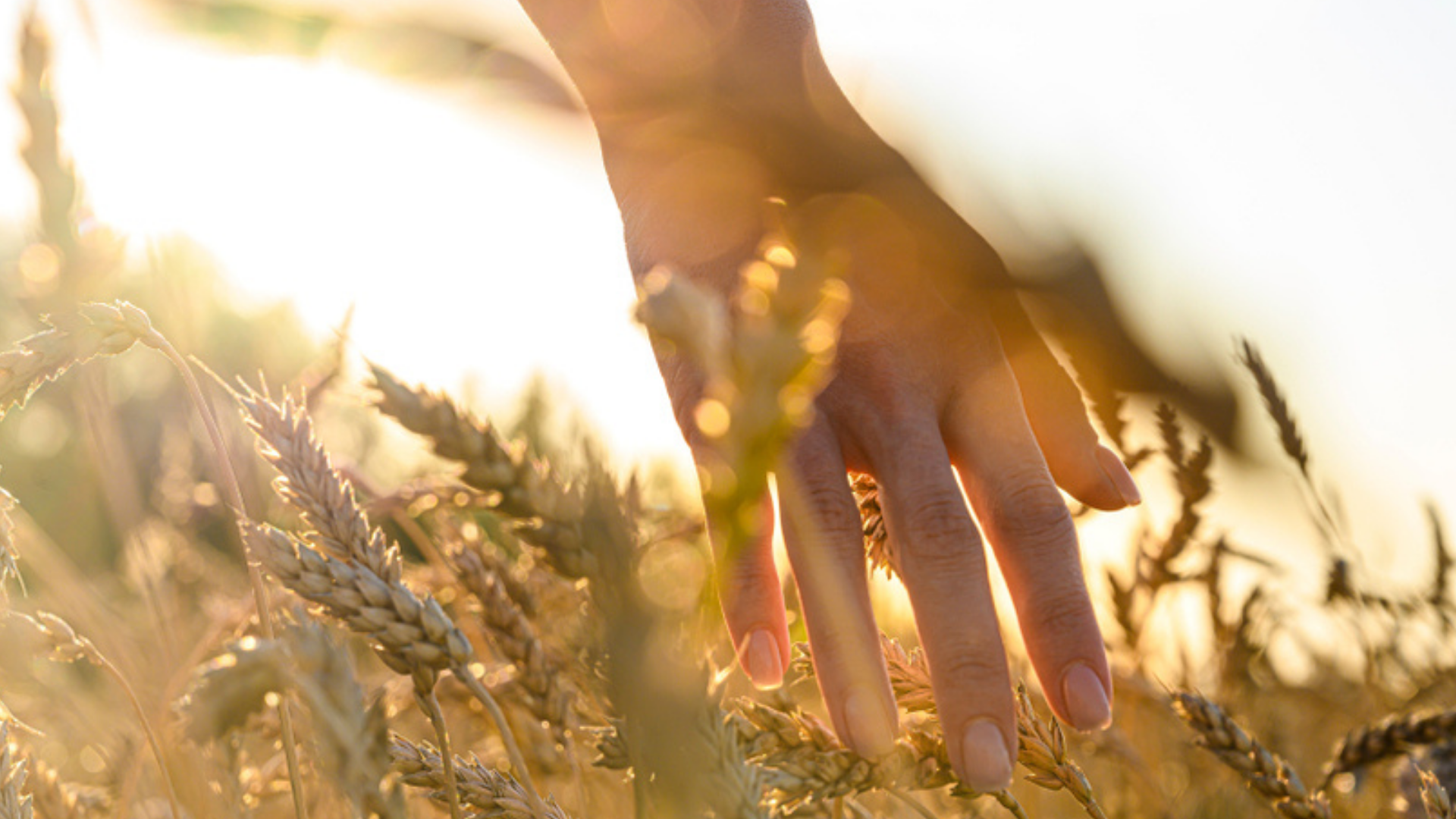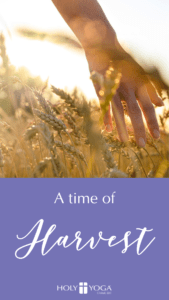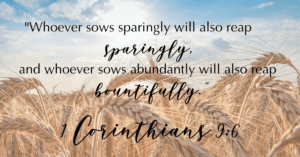
The farmer had a friendly and familiar face. His fields, which were adjacent to the playground, wrapped around two sides of the school. The children waved to him as he rode past in his tractor, and in winter, they skated on his pond at the bottom of the sledding hill.
My brother and I were the only ones on the school playground that sunny afternoon, while our mom was inside prepping materials for her classroom. The farmer, bent over between the green rows in his field, called us over. He held in his hand a peapod, on which he placed a calloused thumb on each side of the center vein. Splitting it open, he revealed tender bright green peas inside and placed them in our hands. The new peas were sweet and fresh, and still warm from the sun. We were grateful he shared his harvest with us.
We had a front row seat to the farmer’s cycles of planting, tending, harvesting and rest. We also watched our father, a landscaper, taking great care to tend the soil in which he worked. In order to have healthy and beautiful flowers and shrubs in the naturally rocky soil of Northern New Jersey, he exercised patience. First, he took the time to dig down deep enough to remove the stones and rocks, which would have prevented the roots from growing down, and then he fed the soil with his compost, which he referred to as “black gold.”
The Parable of the Sower was vivid to me as Jesus described how important the soil was to the harvest: Again, Jesus began to teach by the lake. The crowd that had gathered around him was so large that he got into a boat and sat in it out on the lake, while all the people were along the shore at the water’s edge. He taught them many things by parables, and in his teaching said:
“Listen! A farmer went out to sow his seed. As he was scattering the seed, some fell along the path, and the birds came and ate it up. Some fell on rocky places, where it did not have much soil. It sprang up quickly, because the soil was shallow. But when the sun came up, the plants were scorched, and they withered because they had no root. Other seed fell among thorns, which grew up and choked the plants, so that they did not bear grain. Still other seed fell on good soil. It came up, grew and produced a crop, some multiplying thirty, some sixty, some a hundred times. Then Jesus said, “Whoever has ears to hear, let them hear.” (Mark 4:4-9 NIV)
Jesus was speaking to a people for which the harvest was a matter of life and death. A good harvest season was a time of celebration and great joy. God’s people expressed their dependence, gratitude and obedience to Jehovah Jireh (“the Lord will provide”) by offering the first fruits of their harvest. By offering the first, they acknowledged that everything belongs to God and demonstrated their hope and trust that there was more to come.
Those who have received the gift of God’s grace are His harvest, and the multiplied crops are the fruit of our faith and testimony. In the parable, some seed fell on the path, and was snatched up. These represent those to whom the good news is presented, but they don’t hear it or understand it. The rocky soil represents those who receive the Good news of salvation and joyfully receive it. However, the rocks (temptations) prevent them from sending roots deep enough to develop their faith enough to bear fruit. Their faith appears temporary. The soil that had thorns or weeds is representative of believers who give their lives to Jesus, but their joy and development get choked by the worries and cares of this world.

Finally, Jesus describes good soil in which the seed falls, takes root, grows, and multiplies abundantly. If you have ever planted a seed, you know that it essentially gets buried. At first it looks like nothing at all is happening. The seed requires the right conditions and a certain amount of faith and nurturing from the one who planted it. Some seed will push through a tender shoot within a day or two, and others take much longer. Below the surface, the seed must crack open and perish in order to bear a new life.
Jesus’ parable helps us to understand how the same Gospel message can be received differently by different people. As a child, I hoped my soil was “good” and was warned not to let worry choke my joy and my witness, or allow temptations to turn me away from God. I noticed that other Christians judged and even avoided those whose soil did not appear “good.” Striving and vigilance, however, were not a recipe for peace or deepening my relationship with Jesus. Judgement is an environment that grows self-righteousness and secrecy and shame.
However, the “black gold” of God’s word, adds life to that which the world depletes. Meditating on scripture and practicing Holy Yoga®, makes room for the Holy Spirit to soften the places in my heart, mind and body that have become stuck or hard, and align my will with His.
“Let my teaching fall like rain and my words descend like dew, like showers on new grass, like abundant rain on tender plants.” -Deuteronomy 32:2 (NIV)
In seasons where I feel buried, I am able to find rest, while I wait for growth or His provision. I allow Him to gently weed out my worries. The obstacles of sin and temptation become less heavy. I stop focusing only on myself and want to get out of my own way. Small injustices get swept away. Under the warmth of His love, my heart opens to others with genuine compassion.

What if instead of ignoring those who do not understand the gospel or judging those whose soil appears to have a lot of rocks or weeds, we stepped out in faith from our own gardens and into those of the people God has put around us? As Jesus traveled,
“He saw the crowds, [and] He had compassion for them, because they were harassed and helpless, like sheep without a shepherd. Then He said to his disciples, “The harvest is plentiful, but the laborers are few; therefore, pray earnestly to the Lord of the harvest to send out laborers into his harvest field.” -Matthew 9:36-38 (NIV)
With the love of Jesus as our example, let’s roll up our sleeves and help our neighbors who are struggling to dig out their rocks. We can be compassionate, authentic and accountable with each other. We can invite someone to church, a Holy Yoga class or a meeting. We can come alongside and sit with someone whose heart has become choked with worry or the cares of this world, while pointing them gently to Jehovah Jireh, the Lord of the Harvest, who promises to abundantly meet all their needs. We can continue sowing seeds, knowing that each seed has its own timetable and that we can never really tell what’s happening below the surface. Let’s invite the Holy Spirit, with joyful and expectant hearts, to fill us up, and offer up the “firsts” of our hearts and our resources, resting in the knowledge that He is the One who provides.
The point is this:
“Whoever sows sparingly will also reap sparingly, and whoever sows bountifully will also reap bountifully.” – 1 Corinthians 9:6 (NIV)
What season do you find yourself in? Are you in a harvest season, a planting season or are you waiting for the harvest? Give the Lord praise for the season, trusting that His timing is perfect.
Are there places in your heart that have become hard or stuck? Are worries choking your joy? Spend time in God’s word and ask the Holy Spirit to turn over the soil of your heart.
Who has God put near you, that like the fields Jesus described, may be overlooked and neglected? Step in and share the love of Christ with someone new, and trust the Lord of the Harvest.
Leave your thoughts and answers in the comment section below!
Do you believe God is calling you to more? Discover one of our 15 different and fruitful training programs here!

